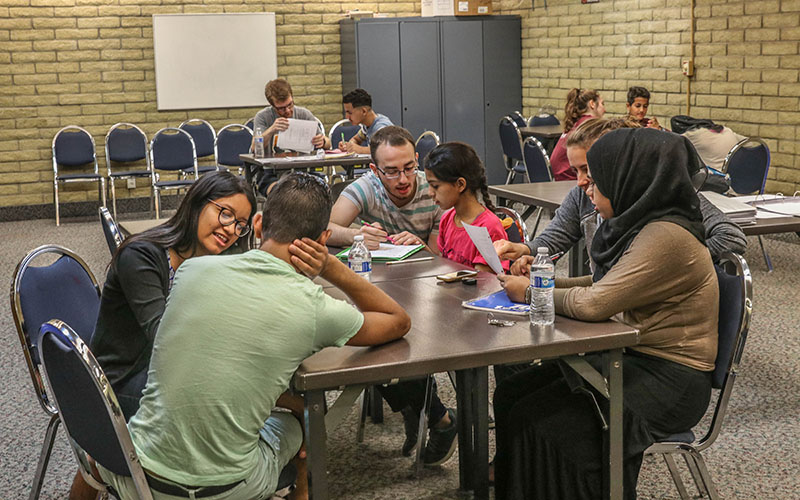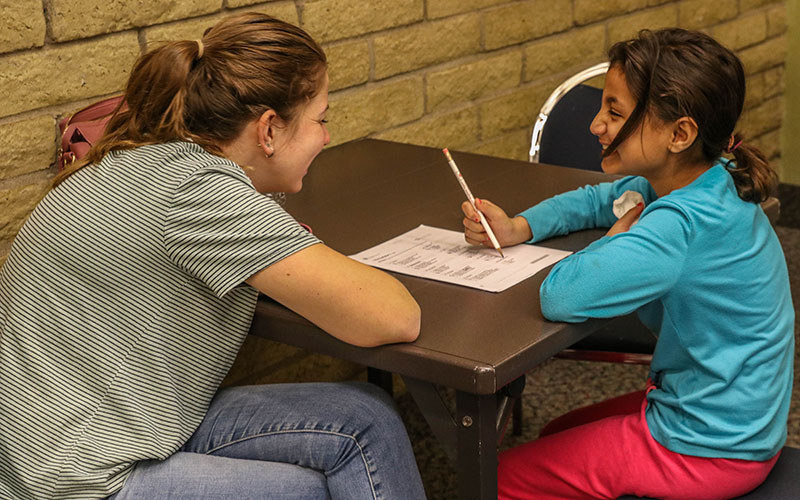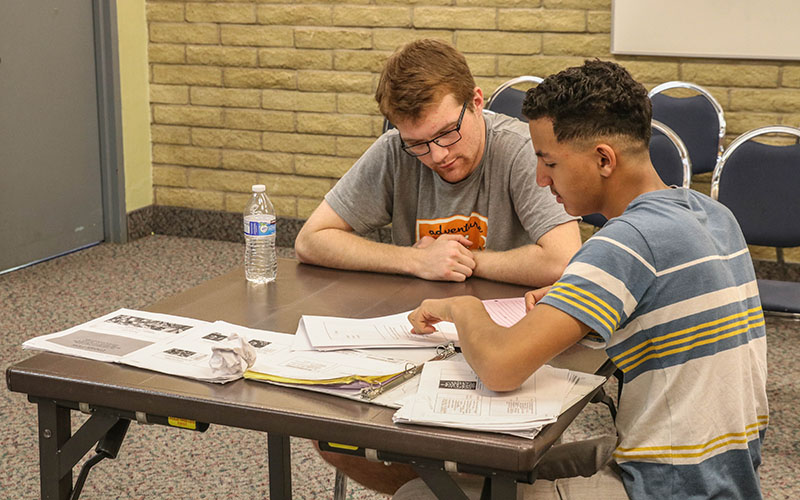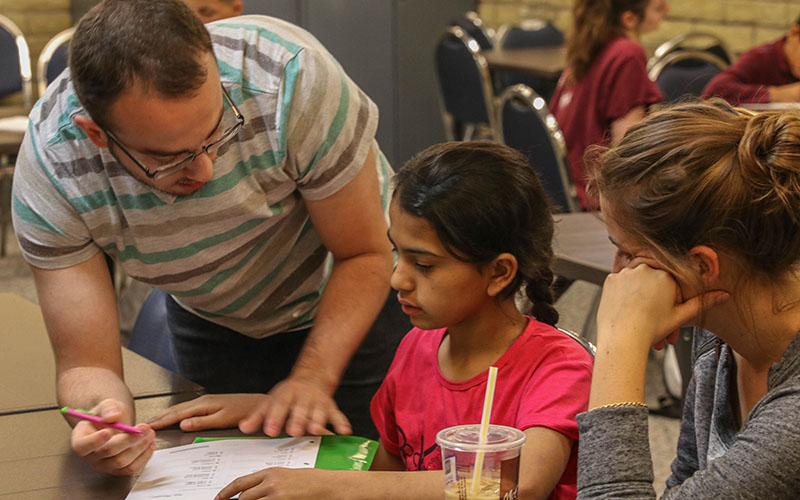- Slug: BC-CNS-Syrian SOS,910
- Photos available (thumbnails, captions below)
By SAEED ALSHAMISI
Cronkite News
TEMPE — Starting at 10 o’clock every Saturday morning, a small group of volunteer tutors takes the time to help local Syrian refugee kids learn and assimilate.
Students Organize for Syria (S.O.S.) provides free weekly tutoring by ASU students who care enough to make a difference.
The students they work with are mostly in high school with some middle and elementary school students as well.
“We have a group of about 20 refugees we’ve constantly been tutoring, but we have had different students at different times and have seen them massively advance in some of their English language skills,” explained Vice President Hamed Alattar, a biology and psychology major and a first generation Syrian American.
S.O.S. was started at ASU five years ago by Alattar’s sister, who is now in medical school. Since then, it has become a national organization with dozens of chapters across the United States.
Alattar makes sure to explain that S.O.S. does not have a political affiliation or any mission besides helping those in need.
“Ours is definitely not a religious or a culturally walled-off organization,” Alattar said. “The vast majority of our members are local ASU students who have no direct relationship to Syria.”
One of those students, Ainsley Pfeiffer, an anthropology major who is now president of the student run organization, shared her own reasons for joining S.O.S.
“Getting to know these kids and their families and how intense of a struggle it is for them really made it a lot more personal for me,” Pfeiffer said. “Initially I was just looking for some kind of volunteering opportunity, but I now consider myself pretty good friends with some of the families, and I think that made me more involved.”
Alattar really appreciates the organization’s members who make the effort every week to be present and engaged at the tutoring sessions and are really dedicated to the cause.
Hasan Rasoul, a psychology major, is one of those tutors.
“I can’t imagine how difficult and frustrating it must be for these refugee children to be in school and not really understand what’s going on,” Rasoul said. “And these schools don’t really have the resources for them or any aid or interpreters even to assist these kids and help them rebuild their lives, at least academically.”
That is where S.O.S. finds its mission: help these young refugees get the extra help they need to succeed.
The refugee students are in English as a Second Language programs or need a little more help with English reading, writing and speaking, as well as learning sciences and other subjects.
“Most of the families we work with have been here a year or a year in a half, and we help them with their homework. If they don’t have homework, we have a stack of worksheets, and we give them what’s around their level so they can practice,” Pfeiffer explained.
In order for the program to be successful, the S.O.S. model assumes having fun has to be a big part of the learning experience. The basic agenda provides a flexible method that takes into account the students’ specific learning styles as well.
“Our goal is to make sure that the students feel we are there for them and will have patience with them and help them succeed in their tasks,” Rasoul said.
Being there for the Syrian refugee students and having fun means the S.O.S. tutors do a lot more than just tutor. In addition, they run events that bringing the refugee families together and connecting them to the greater community to help the students progress socially.
P“Though our primary energy has been focused on expanding tutoring, we also started reaching out to more families and started doing fun things around Phoenix as well as learning,” Pfeiffer said. “We’ve gone bowling, took them to the ASU campus for a sports day, toured the science museum, and have done other advocacy events.”
The tutors said many of the children look forward to these events because in their daily lives and their social interactions at school, they don’t have a lot of interactions with people who are interested in them. They socialize normally in very close circles with their siblings and very close friends.
“It’s really tough for these kids to be social outside of those communities, so it’s really positive for them to have these larger social interactions,” Alattar said.
While knowing Arabic, the primary language the Syrian refugees speak, is helpful when tutoring, Alattar said it is just as beneficial and at times even more beneficial to speak English.
“Picking up the kids, we talk in the car and practice regular conversational English as opposed to formal learning,” Pfeiffer said. “Whereas if an Arab tutor picks them up, they’ll speak Arabic. It can definitely be used as a crutch, but it’s also a fantastic tool to explain things, especially in math and science or explaining instruction. I think it’s important to have a mixture.”
What this mixture of tutors for S.O.S. have in common is a generous spirit and an appreciation for the work they are doing.
“For someone in a very foreign environment, speaking a very different language, the obstacles of a high school become exponentially larger. If you come to an event and see the fun these kids are having and the smiles on their faces, both the ASU students and the refugees, both sides of the table are completely ecstatic. It’s a beautiful thing,” Alattar said.
^__=
S.O.S. provides free tutoring services for new refugee children or teenagers who are in ESL programs or who need a little more help with English. (Photo by Saeed Alshamisi/Cronkite News)
“Education in general interests me, and how powerful it can be, but also how unequally distributed it is. A lot of these kids we see are just thrown into the school system; just put in an algebra class and just have no idea.” Ainsley Pfeiffer President S.O.S. (Photo by Saeed Alshamisi/Cronkite News)
This student works with her tutor, smiling when she understands the question. (Photo by Saeed Alshamisi/Cronkite News)
When asked why he volunteers, tutor Hasan Rasoul said: “To make sure that they understand that we are there for them and have patience with them and help them succeed in their tasks.” (Photo by Saeed Alshamisi/Cronkite News)
“When you see these kids, when you interact with them, they sort of become your extended family, and you really see them develop whether it be their language or socially. It’s really self-fulfilling,” explains volunteer Hamed Alattar. (Photo by Saeed Alshamisi/Cronkite News)




